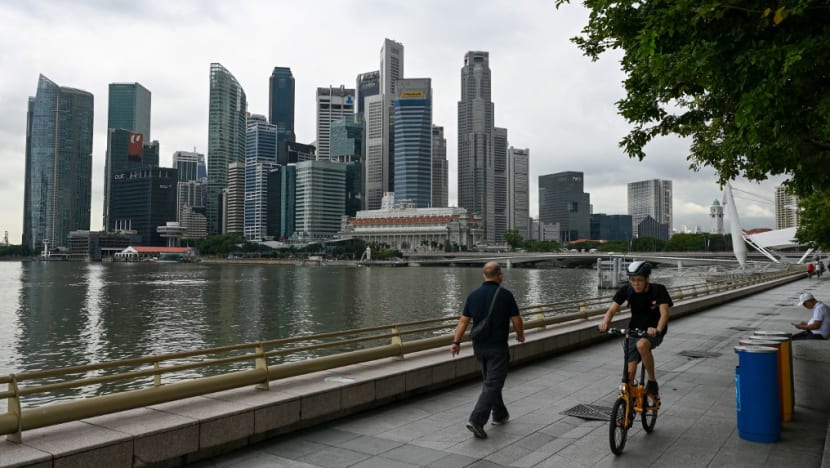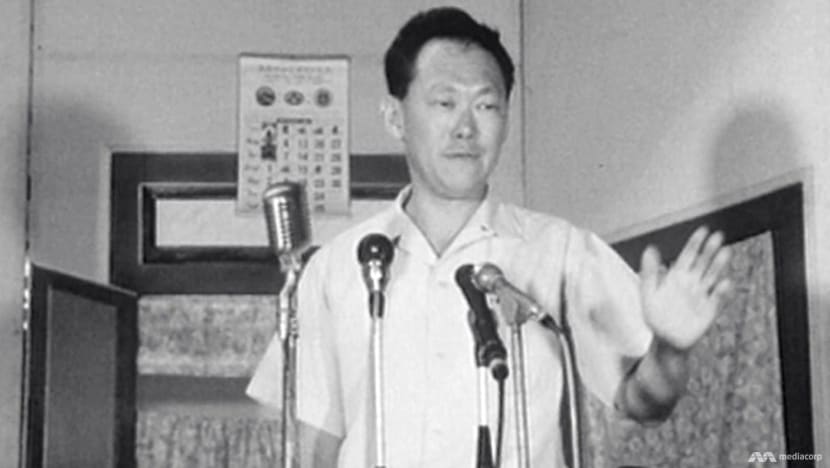Singapore's race and religion ideals still work in progress, country is no more stable than others: Shanmugam
The Home Affairs Minister noted that Singapore’s founding fathers had enshrined the foundational principles of unity in diversity, justice and equality in the National Pledge.

A general view shows the financial business district in Singapore on Jan 3, 2022. (Photo: AFP/Roslan Rahman)

This audio is generated by an AI tool.
SINGAPORE: Singapore has tried to achieve the multiracial ideals in its pledge over 60 years of independence, but it remains a work in progress, said Coordinating Minister for National Security K Shanmugam on Tuesday (Oct 14).
And while Singapore may look stable now, it is “no more stable than other countries” before their communal relations became worse, he added.
Mr Shanmugam, who is also Home Affairs Minister, said that if future generations of political leaders are tempted or pressured to engage in identity politics, it would be a “one-way street to ruin”.
“And then Singapore will suffer ... We will experience the same conflicts and divisions we see unfolding elsewhere in the world," he said, while delivering a ministerial statement in parliament on race and religion.
Mr Shanmugam had warned last month of the worrying trend of politicians in Singapore playing identity politics based on race and religion, in the wake of the death of US right-wing activist Charlie Kirk.
On Tuesday, he reiterated that Singapore's ideals have not yet been fully achieved.
“Minorities in particular will tell you about lived realities on the ground. That they sometimes face racism at different levels, that they sometimes feel discriminated against,” he said. “Beyond what each of us hears, surveys show how minorities feel.”
Some Chinese will “also tell you of their experiences, though the instances are much fewer”, he added.
In a Facebook post on Tuesday evening, Prime Minister Lawrence Wong said that Singapore enjoys racial and religious harmony today, but it is not immune to the dangers of identity politics. He noted that Singapore has seen attempts to bring race and religion into the political arena even in recent years and past elections.
“There will always be areas where faith and public issues intersect, and the government recognises this complexity. Everyone is free to practise their faith and express their views on national matters. But the public and political debate must be conducted and decided on a secular basis,” he said.
“All political parties must be clear: race and religion must never be exploited for political gain, or used in election campaigns. Once that line is crossed, we risk a destructive competition for influence among different groups - and Singapore will become deeply divided, as we have seen in many other countries.”
Senior Minister Lee Hsien Loong said in a separate post that Singapore has strived hard for the past 60 years to build a harmonious, cohesive, multi-racial and multi-religious society.
“Yet from time to time, our social tapestry faces threats from identity politics, most recently in #GE2025.
“We have seen around the world how identity politics can divide societies. Inevitably, the minorities end up marginalised and suffer the most. Singapore is a small country – we cannot afford such divisions,” he wrote.
HOW SINGAPORE WENT AGAINST "THE NORM"
Back in 1965 when Singapore became independent, the norm in many countries was that the language and culture of the majority would automatically be the language and culture of the state.
But Singapore's founding fathers took “a very different approach”, said Mr Shanmugam on Tuesday.
Founding Prime Minister Lee Kuan Yew said on the day of Singapore’s independence that “this is not a Malay nation; this is not a Chinese nation; this is not an Indian nation. Everyone will have his place, equal: Language, culture, religion”.
The founding fathers also enshrined the foundational principles of unity in diversity, justice and equality in the National Pledge.
“All citizens, regardless of race, language, or religion, were to have equal status,” said Mr Shanmugam.
Policies were also designed to enable each ethnic group to preserve its own cultural heritage.
At the same time, common spaces would be enlarged to facilitate interaction and understanding between the ethnic groups, said Mr Shanmugam.
English was used as the language of administration and instruction, which meant it was used in schools; and at the same time, students studied their mother tongue as a second language.
Selected festivals of major ethnicities were also designated as public holidays. And on the ground in the heartlands, activities were organised for all ethnicities, to promote multiracial harmony.
Religious freedoms were also protected in the Constitution, said Mr Shanmugam.
At the same time, Singapore retained Malay as its national language. “This meant that we continued singing our national anthem Majulah Singapura proudly in Malay in schools and at national events,” he noted.
This was a different approach compared with those taken by most countries.
“We did not force any ethnic group to assimilate. The majority group accepted that while they were the biggest group, they should nevertheless take extra care and make sure that the minorities were not slighted,” said Mr Shanmugam.
"It was in this spirit of multicultural integration that each ethnic group was encouraged to preserve and promote their heritage,” he added. "And we created space - space to enhance mutual understanding and develop a common identity.”
Mr Shanmugam said the founding fathers faced “tremendous opposition” to this approach.
Many Chinese organisations, including the highly influential Singapore Chinese Chamber of Commerce, had asked the government to make Mandarin the national language and the only official language of the country.
They questioned why this was not the case since the Chinese were 77 per cent of the population, among other questions.
Mr Shanmugam said the main opposition party to the People’s Action Party (PAP) at the time, Barisan Sosialis, took an “active position on this matter”, as the communist-inspired Left in Malaya and Singapore had long relied on the mobilisation of Chinese-educated students and labour organisations.
The minister added that the “politically expedient course” for the PAP government would have been to agree to these demands. Doing this would have helped to anchor the support of the majority Chinese community: In the run-up to the 1963 General Election, the PAP government’s majority had steadily whittled down.
The PAP’s position did improve after the 1963 General Election, but it was still in a fierce contest with Barisan Sosialis.
“At a time, when the PAP government needed the support of the majority Chinese population, Mr Lee and his colleagues chose the path that would in most contexts be seen as politically foolhardy,” said Mr Shanmugam.
“I would ask Members to take a moment to reflect, think about this. You will realise how extraordinary their actions were - how this cuts against all political realities and standard norms.”

POLICIES TO REALISE IDEALS
Mr Shanmugam on Tuesday said it was a key point that Singapore's multiracial and multi-religious principles are set out as ideals.
“We swam strongly against the tide – the tide of ethnic identity as the organising principle of society,” he said. “Instead, our foundational principles were a secular state, meritocracy, multi-racialism, equal opportunities for all and the rule of law."
He pointed to two key policies to make the ideals a reality.
The first was a strong legal framework to protect communal harmony and to minimise racial and religious conflict.
For example, the Maintenance of Religious Harmony Act and more recently, the Maintenance of Racial Harmony Act are laws that set out ways Singapore can deal with threats in these spaces.
These are just two laws in a “whole framework of laws” that seeks to preserve Singapore’s racial and religious space, and deal firmly with attacks on race and religion.
For example, hate speech and offensive speech against races and religions is disallowed.
“We also know that people will have views on sensitive issues and that these views should not be suppressed,” said Mr Shanmugam. “So we provide safe spaces where honest, frank discussions can be held.”
These include closed-door dialogues, fireside chats and regular engagements with different groups including young people, entrepreneurs, religious groups, unions, non-profits and many others.
“These settings encourage people to be rational, responsible; while pulling no punches on the substance of their views,” he added.
But while laws can deter and penalise actions that seek to divide society, laws alone cannot make society harmonious, said Mr Shanmugam.
This is where the second key policy framework comes in: To encourage intermixing and understanding between different communities.
Examples of this include the Ethnic Integration Policy in public housing, national schools, National Service and events in heartlands.
“In the past, critics have mocked this as ‘social engineering’, and a violation of free choice,” said Mr Shanmugam. “But today, many look at our high level of social cohesion, and ask: ‘What is your secret sauce?’”
He said that despite global perceptions, the Singapore government “make(s) no apologies for our philosophy”, one which “extends well beyond economic planning”.
“The government also takes an active stand and approach in managing social issues, housing issues, community issues, and more,” he said. “But for this approach, Singapore would not be where it is today.”
While it has been shown in polls that Singapore has an exceptionally high level of racial and religious harmony, Mr Shanmugam said he was not suggesting that race and religious harmony is perfect in Singapore.
“But as a system, we have sought to contain and overcome the natural human impulses, by overlaying them with a broader sense of national identity; community of shared values, experiences and vocabulary,” he said.
WHY SINGAPORE HAS BEEN STABLE SO FAR
So far, the situation in Singapore has been broadly stable because the government has anchored the country on the ideal of multiracialism, said Mr Shanmugam.
“The governing party itself has eschewed identity politics and fought against attempts to rile up the different ethnic communities,” he said. "It has set out the fundamental ideals on how our society should be structured, and it has managed to convince most Singaporeans to accept those ideals.
Meanwhile, from time to time, various parties and candidates have tried to stir up the Chinese and Malay communities, he said.
“Because of the PAP government’s political dominance, these efforts have not been successful,” he added.
Former Workers’ Party (WP) politician and veteran lawyer Tang Liang Hong, who contested in the 1997 General Election, was accused by the PAP at the time of being an anti-Christian Chinese chauvinist who threatened the country’s racial and religious peace.
Tang died last month at the age of 90.
In the 1991 GE, then-WP candidate Jufrie Mahmood was labelled by the PAP a “Malay chauvinist” after his outspoken statements about racial inequality and the situation of Malays in Singapore, according to AcademiaSG, a website run by Singapore academics. Mr Jufrie is currently a member of the Singapore Democratic Party.
Mr Shanmugam said the PAP has been able to bear the political cost of fighting against such sentiments.
“Making this statement – this statement here today – it would actually have been easier to leave all of this unsaid. But this statement has to be made in the country’s interests,” he said.
Now that elections are over, and emotions no longer run as high, Mr Shanmugam said he was making this ministerial statement “to remind ourselves as Singaporeans about the framework and fundamentals that have allowed Singapore to succeed”.
He said that while it was not the first time the issue is being discussed in parliament, events during the recent General Election “warrant this being raised again”.
Mr Wong had called a press conference in April in the midst of election campaigning to stress that foreigners urging Singaporeans to vote along religious lines have "crossed the line".
He also urged all political leaders to also firmly reject overseas endorsements, and called on all political parties to make their positions clear – not only on foreign interference, but also that identity politics has no place in Singapore and religion should never be mixed with politics.
“It is too serious a matter – existential to Singapore – for us to simply let it slide, and so I decided to make this statement at the earliest opportunity after the opening of parliament,” said Mr Shanmugam.
He said the main purpose of the statement was to set out Singapore’s fundamentals, to which he hoped there would be “clearer understanding of how we hope politicians and political parties will conduct themselves in future should these issues arise again”.
“We must learn from what has happened,” he added.
He said parliamentarians may debate and disagree on many things. “But I hope that we can all commit to handle issues of race and religion in a responsible and sensible manner, and to uphold the integrity of Singapore’s secular politics."
Mr Shanmugam noted that other than Mr Wong’s reminder during the hustings, the Ministry of Home Affairs and Elections Department during the same period had also issued a strong statement warning against bringing race and religion into politics.
And in the recent President’s Address, President Tharman Shanmugaratnam reminded Singaporeans that “we can never take our unity for granted and must guard it zealously”.
During the debate on the President’s Address, Prime Minister Wong also urged all political parties to conduct politics with seriousness, with integrity and a deep sense of responsibility.
“So why do we keep repeating these points over and over again? It is because these fundamental principles are central to the very existence of Singapore,” said Mr Shanmugam. “We decided that we should state our position formally, robustly and unequivocally at the highest forum in our country – the parliament.”
Mr Shanmugam then raised a moment in Singapore's history that he said "few here will remember".
On the day Mr Lee Kuan Yew pledged that Singapore will not be a Malay nation, Chinese nation, Indian nation and that all will be equal, then Malaysian Prime Minister Tunku Abdul Rahman said he had asked the Johor state government to set aside 10 acres of land for any Malay in Singapore who wished to leave the newly independent country.
Mr Shanmugam said this might have appeared an attractive option to some of the pioneer generation Malays – get some land and remain a member of the majority in "Tanah Melayu", or the Malay land.
"But not a single pioneer generation Malay took up the offer. They chose to stay in 'Tanah Singapura' instead and build a home here," he said.
"We owe them so much. If they had left, we wouldn’t have remained a multiracial country as we are now. Also, if the Chinese majority had at that point refused to listen to Mr Lee, then we wouldn’t be the multiracial country that we are today."
GENERATIONAL DIFFERENCES
In a clarification after Mr Shanmugam's statement, Leader of the Opposition and secretary-general of the Workers' Party Pritam Singh asked if the government was considering a new "framework", given differences between how older and younger generations approach race and religion issues.
"Can we, for example, see more safe spaces or different styles in trying to deal with race or religion issues, particularly for the reasons that the minister states - the nature of social media and how a certain tribalism can develop in society," said Mr Singh.
Mr Shanmugam said that on many issues, demographically there are different viewpoints and it was important to "analyse them carefully, not jump to conclusions".
He said that on some issues, younger people can be "more nationalistic and more Singaporean" compared to the older generation.
"And we find that younger Singaporeans are less prone to foreign influence compared with some demographics in the older generation," he said. "There are a variety of things that the government is doing and also constantly analysing, but we always welcome ideas on how we can do this better, and if they are workable, we will consider."






















